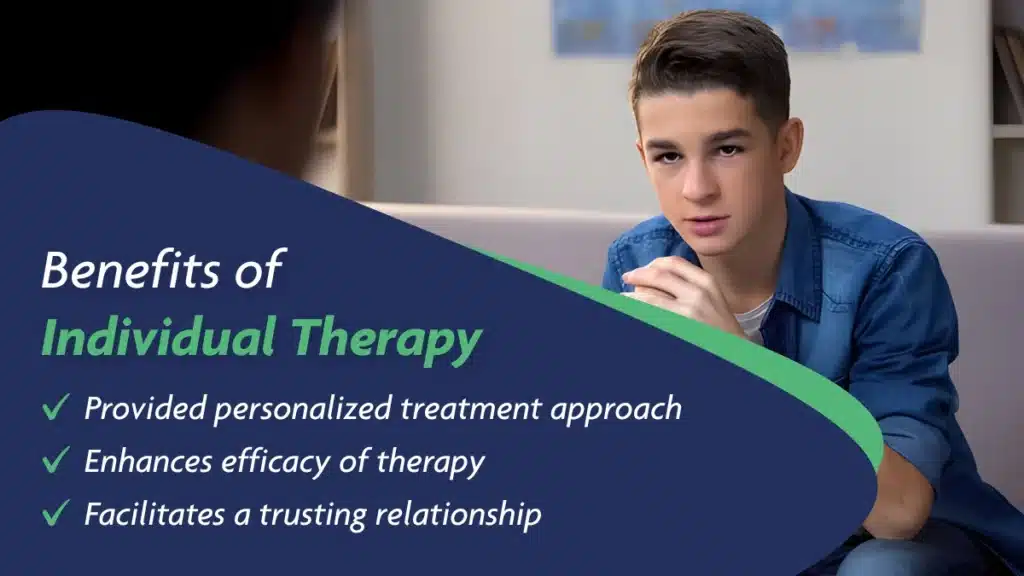Individual addiction therapy provides personalized support to help teens overcome substance misuse. Through one-on-one sessions with a trained therapist, teens explore underlying issues driving their addiction and develop coping skills to manage cravings and triggers.
Therapy equips teens with tools to navigate challenges, revamp relationships, and regain control over their lives. This article explores how therapy promotes long-term recovery and prevents relapse by focusing on personal needs and strengths.
Key Takeaways
Individual therapy offers personalized support for teens battling addiction, tailored to their unique needs. Here’s what you need to know:
- Through one-on-one sessions, teens can explore the root causes of their addiction and co-occurring disorders.
- Various therapeutic approaches are utilized to address addiction and underlying issues effectively.
- Individual therapy plays a pivotal role in addiction treatment by providing personalized support and promoting long-term recovery and sobriety.
Our teen treatment center offers a nurturing environment dedicated to empowering adolescents on their journey to recovery from addiction. Call us at (845) 479-6888 to learn more about our valuable services.

Definition Of Individual Therapy
Individual therapy is a personalized form of counseling aimed at helping people overcome substance misuse. It involves one-on-one sessions with a trained therapist, where teens explore the root causes of their addiction and develop plans to cope with cravings and triggers.
Therapy addresses mental health concerns, trauma, and co-occurring disorders alongside addiction. Individual counseling promotes long-term recovery and helps prevent relapse. It provides a safe space for teens to rebuild relationships and regain control over their lives.
Importance Of Therapy In Treating Addiction
Therapy plays an integral role in treating addiction by providing personalized support and strategies to overcome substance misuse. It helps parents understand the root causes of their teen’s addiction and develop coping skills to manage cravings and triggers.
Therapy also addresses underlying mental health concerns, trauma, and co-occurring disorders, which often lead to addiction. It provides a safe and supportive atmosphere for teens to explore challenges, rebuild relationships, and regain control over their lives. Ultimately, therapy empowers teens to lead healthier, fulfilling lives free from the grip of addiction.
Types Of Individual Therapy For Addiction
Individual addiction therapy encompasses various approaches tailored to address the unique needs of teens facing substance misuse. These therapies provide personalized support and strategies to help teens crush addiction and achieve long-term recovery.
Cognitive Behavioral Therapy (CBT)
Cognitive behavioral therapy (CBT) helps teenagers identify and change negative thought patterns leading to addiction. Therapists work with clients to identify triggers, develop coping strategies, and challenge distorted thinking. CBT equips teens with practical skills to manage cravings, handle stress, and prevent relapse. It focuses on building resilience and motivating teens to take control of their lives.
Motivational Interviewing (MI)
Motivational Interviewing (MI) aims to enhance motivation and commitment to change addictive behaviors. Therapists use empathy, reflective listening, and open-ended questions to explore ambivalence and elicit intrinsic motivation for change.
MI helps teens resolve tensions and build confidence in their ability to overcome alcohol addiction or any substance abuse. It promotes a collaborative and non-confrontational approach to facilitate positive changes.
Contingency Management (CM)
Contingency Management (CM) utilizes incentives and rewards to reinforce positive behaviors and discourage substance use. Clients earn rewards, such as vouchers or privileges, for achieving treatment goals, such as attending individual therapy sessions or passing drug tests. CM provides immediate reinforcement for desired behaviors, helping teens stay motivated and engaged in treatment. It effectively promotes abstinence and fosters a supportive treatment environment.
Dialectical Behavioral Therapy (DBT)
Dialectical behavioral therapy (DBT) combines cognitive behavioral techniques with mindfulness practices to help teens regulate emotions and develop healthy coping skills. DBT focuses on building distress tolerance, interpersonal effectiveness, and emotion regulation skills to manage intense feelings and prevent impulsive behaviors, including substance use. It promotes acceptance and change, empowering teenagers to live meaningful lives.
Eye Movement Desensitization And Reprocessing (EMDR)
Eye movement desensitization and reprocessing (EMDR) is a therapeutic approach used to process and heal trauma underlying addiction. EMDR helps teens reprocess traumatic memories and experiences, reducing their emotional impact and associated symptoms.
By merging bilateral stimulation, such as eye movements or tapping, with cognitive restructuring, EMDR boosts the adaptive processing of traumatic memories, leading to symptom relief and emotional healing. It supports children in overcoming trauma-related triggers and achieving sustainable recovery from addiction.
Role Of Individual Therapy In Treating Addiction
Individual therapy plays a pivotal role in the treatment of addiction by providing personalized support and strategies tailored to each individual’s needs. Therapists work closely with clients to address underlying issues, develop coping skills, and promote long-term recovery from substance misuse.
Identifying And Addressing Triggers
In individual therapy for addiction, addressing triggers is vital to mitigate risks. Triggers are situations, emotions, or thoughts that lead to cravings and substance use.
Therapists help teens identify their triggers and develop strategies to manage them effectively. This way, teens can reduce the risk of relapse and maintain sobriety.
Building Coping Mechanisms And Skills
Individual therapy focuses on building coping skills to deal with cravings, stress, and difficult emotions without resorting to substance use. Therapists teach practical strategies such as relaxation techniques, problem-solving skills, and healthy coping mechanisms to replace destructive behaviors. By developing these skills, teens increase their resilience and ability to navigate challenges, leading to sustained recovery.
Committing To Sobriety And Preventing Relapse
A crucial aspect of individual therapy is helping teens commit to sobriety and prevent relapse. Therapists work with clients to set achievable goals, create personalized relapse prevention plans, and develop strategies to maintain motivation for recovery.
Through ongoing support, teens strengthen their commitment to sobriety and learn to recognize and manage potential relapse triggers effectively. This proactive approach empowers teens to stay on track with their recovery journey and live fulfilling, substance-free lives.
Benefits Of Individual Therapy For Addiction
Individual therapy for addiction offers several benefits that lead to effective treatment. Firstly, it provides a personalized approach, allowing therapists to tailor treatment plans to each individual’s needs and circumstances. This customized approach enhances the efficacy of therapy and increases the likelihood of successful outcomes.
Additionally, individual therapy facilitates the development of a safe and trusting relationship between the client and therapist, creating a supportive atmosphere for exploration and growth. This relationship fosters open communication and collaboration, essential parts of the therapeutic process.
Moreover, individual therapy offers opportunities for deep self-reflection, enabling teens to explore underlying issues, gain insight into their thoughts and behaviors, and make meaningful changes. Through these benefits, individual therapy plays a vital role in helping teens overcome addiction and achieve lasting recovery.
Suitable Candidates For Individual Therapy For Addiction
Individual addiction therapy is beneficial for individuals seeking personalized support and strategies to overcome substance misuse. It is suitable for those who require tailored treatment approaches to address their unique needs and circumstances effectively.
Evaluation Of The Severity Of The Addiction
Before starting individual addiction therapy, it’s crucial to evaluate the severity of the addiction. This review helps determine the appropriate level of care and treatment intensity needed for the individual. Therapists assess factors such as frequency and duration of substance use, impact on daily functioning, and previous treatment history to tailor the therapy approach accordingly.
Consideration Of Co-occurring Mental Health Conditions
Teens with addiction often experience co-occurring mental health conditions such as depression, anxiety, or trauma. It’s essential to consider these conditions in therapy to provide complete treatment. Therapists conduct thorough assessments to identify co-occurring disorders. They also integrate appropriate interventions into the treatment plan to address both addiction and mental health issues effectively.
Individual addiction therapy is suitable for teens with varying needs and preferences. To ensure a tailored approach, therapists assess personality, cultural background, and treatment goals.
Frequently Asked Questions (FAQs)
What are individual and group therapy?
Individual therapy involves one-on-one sessions between a patient and a therapist to address substance use disorders like alcohol or drug addiction. It focuses on personal struggles, past experiences, and specific needs to develop coping skills and set goals.
Group therapy involves sessions with multiple patients and therapists, offering support and sharing experiences among members. It’s effective for building interpersonal relationships and learning from others.
Examples include dialectical behavior therapy for borderline personality disorder. Family therapy involves family members and targets the dynamics contributing to substance abuse. Both individual and group therapies are crucial in addiction treatment, alongside support groups and detox.
How long does addiction therapy take?
Addiction therapy duration varies. It typically lasts from a few weeks to several months. It depends on individual needs and progress. Some may require longer treatment.
Therapy involves counseling and support groups. It helps to address underlying issues and develop coping skills. Teens with substance use issues benefit from family involvement. Therapists tailor treatment plans to suit each person.
Effective therapy considers the type and severity of addiction. It’s crucial to stick with therapy for lasting results. Recovery is a journey, and therapy is a vital step. Support and commitment are key to success.
Ignite Your Teen’s Journey To Recovery
At our teen treatment center, we understand the unique challenges of addiction adolescents face.
Adolescents can forge meaningful links within our welcoming residential care while undergoing specialized treatments. Experience the transformative power of individual and group therapy sessions, providing a nurturing space for self-expression.
Engage in joyful recreational activities and holistic therapies, fostering holistic well-being. Guided by our empathetic staff, your teen can crush struggles with alcohol, cocaine, or any other substance.
Contact us at (845) 479-6888, and let us provide the safety and support teens deserve on their journey to recovery.


